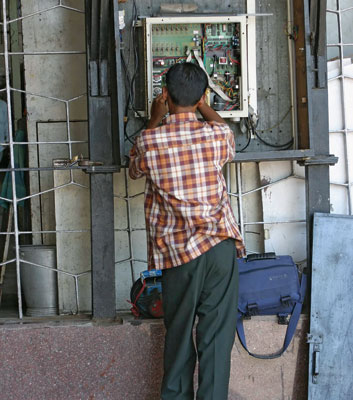Essay: Work
More than just a job
The Indian town of Arni is perhaps one of the world’s most intensively researched labour markets. This municipality in Tamil Nadu state has been the subject of international studies for more than four decades. During this time, its population has grown from 30,000 to more than 100,000 – so it is still a small town by Indian standards. But thanks to the researchers’ efforts, we know quite a lot about Arni. For example, it has more than 700 self-employed electricians – but only 320 of them are officially registered. And many in this latter group ‘inherited’ their licences from relatives: only 20 of Arni’s electricians have any formal training.

This minor statistic illustrates a phenomenon known in economics as ‘informal employment’. It means work that is not regulated or protected by the state. Located at the crossover between home and industry, informal employment is almost impossible for economists to capture in statistics. People in informal employment have no pension provision, no sickness cover, no health and safety regulations – and no security. Even today, most of the world’s workers are employed in this grey area – or blackspot. Indeed, this applies to more than two thirds of workers in some Asian and sub-Saharan countries and to more than half the workforce in Latin America and North Africa. Even in the OECD states, the estimated figure is a staggering 15 per cent. In other words, much of what we call work takes place outside the state’s regulatory frameworks.
Exploitation generally takes place in informal settings
In India, an estimated 80 per cent of the workforce is employed in the informal sector, which thus generates a major share of the country’s GDP. That’s why British researcher Barbara Harris-White – who has also studied Arni – warns that national and international employment policy will fail to reach the majority of people unless it also targets the informal sector. Bringing it within the state’s regulatory orbit and subjecting it to proper control is especially important because criminal activities such as the use of child labour, modern slavery and the exploitation of women generally take place in informal settings and thus often go undetected.
Creating more formal employment is therefore one of the key goals of international cooperation – and should form part of national education and employment policy as well. In situations where this is not possible, at least not immediately, efforts should focus at the very least on improving conditions in the informal sector. The International Labour Organization talks about ‘decent’ work as the primary focus, because employment alone is not enough – working conditions are just as important. Decent work benefits people by offering them more security and protection, and it also benefits countries and governments – because jobs in the formal sector generate more tax revenue. And that is important, for robust public budgets are essential in enabling governments to spend on services such as education, health and infrastructure, which in turn are important economic factors for job creation, thereby closing the loop.
The employment problem ist not due to a lack of work
Work has great significance for the individual as well as for society. It determines our social status and provides a structure for our day. That makes it a frequent topic of conversation. We have all heard the quip: ‘I don’t have time to do any work – I’m too busy earning a living!’ It never fails to raise a smile, but there is a lot of substance behind the humour. The employment problem is not due to a lack of work – there’s plenty of that around. The real problem, in many cases, is the lack of decent pay.
‘Choose a job you love, and you will never have to work a day in your life.’
Confucius, Chinese philosopher and teacher
Some people approach the issue from a different angle. They don’t spend their time earning money – they want to do something more meaningful. One of them is Peter Abualzolof, an American with Palestinian roots, who gave up a job in Silicon Valley in 2013 to return to the land of his childhood. As a project manager, he helped to create the West Bank’s first-ever startup incubator, set up the Palestinian branch of Startup Grind and ultimately launched his own company, Mashvisor, which provides investment analysis and advice for the US real estate market. In financial terms, these activities are a retrograde step compared to his previous job, but Peter Abualzolof is happier than ever before.
As this example shows, work is not just about earning money. It provides a purpose in life and is essential for personal fulfilment. It promotes wellbeing – both physical and psychological – and is a ‘master key’ to solving broader social problems. The diverse challenges facing humankind today can be broken down, at least to some extent, to problems with employment.
Work creates equality and prospects for the future
But what do we mean when we talk about ‘work’? We mean a ‘purposeful, planned and social activity that produces outcomes or products’, according to the relevant literature. Work is the basis for not only producing but also distributing goods and services. Work creates equality and prospects for the future. Being in work is seen as desirable – according to Germany’s Integration Barometer, which surveys people’s opinions on migration and integration, work is important for becoming integrated in society – more so than practising one’s religion. ‘The job comes first’: it may be a cliché, but it still holds true.
But there’s one problem: the lack of this vital commodity in many places. In the West Bank, for example, one in four people are out of work, rising to one in two in the Gaza Strip, where the blockade is still in place. For young Palestinians with a university degree, it is especially hard to find work. This leads to frustration and out-migration. People leave their country not primarily because they hope to find work elsewhere but because there is no hope of ever finding work at home.

All over the world, it is young people and women who are most often excluded from formal employment. As a result, they endure miserable working conditions and irregular wages – or work for no pay. There were good reasons why most of the countless demonstrators during the Arab Spring were well-educated but jobless young people with no prospects for the future. Unemployment is risky: it is a potential trigger of government crises and drives people out into the streets and across the seas.
In Tunisia, for example, youth unemployment has risen since the 2011 revolution: according to a World Bank study, more than 23 per cent of urban 15- to 29-year-olds and almost 50 per cent of young people in rural Tunisia were unemployed in 2014. The percentage of jobless graduates and women is particularly high. It is a similar picture in Egypt: youth unemployment has risen substantially since 2011, reaching more than 40 per cent in 2014. Even industrialised countries such as Spain, Greece and Portugal now have shockingly high rates of youth joblessness. Peaceful social relations therefore rest on fragile foundations.
Lack of education one of the main causes of youth unemployment
Lack of education is one of the main causes of youth unemployment. This statement appears to conflict with the fact that in North Africa, for example, joblessness mainly affects young graduates. One explanation for this paradox is provided by a survey of Egyptian entrepreneurs, who reported that less than one third of university graduates and only 16 per cent of vocational college graduates have appropriate qualifications. In that case, what hope is there that the much larger group of young people with neither a university nor a vocational education will offer the skills that companies need?
According to Nadine Fawzy, a National Project Coordinator with the United Nations Industrial Development Organization (UNIDO), vocational training is the most important weapon in the fight against youth joblessness and high levels of informal employment. The tremendous need for vocational training is also recognised by GIZ in its projects around the world. It aims to build a smart mix of theoretical and practical skills and is working to promote this model in numerous countries, not least in the North African crisis region. Every year since 2006, GIZ has helped 100,000 young people around the world to gain vocational qualifications.
Creating new jobs for skilled workers
According to Nadine Fawzy, two other factors have an important role to play in lifting people permanently out of joblessness and informal employment: technical know-how and startup funding. UNIDO is therefore supporting small farms in Egypt that are creating jobs for people with a variety of qualifications and employing unskilled workers as well as graduates at various stages of their production chains. The project has shown that providing investment support for greenhouses, for example, not only increases agricultural output but also creates two to three new jobs for skilled workers for every 0.42 hectares of greenhouse, with additional workers being hired on more than 350 days a year.
The data obtained from the many studies conducted in the Indian town of Arni also indicate which specific activities are helpful in sustainably improving working conditions. In Arni, for example, a formal banking system has been set up, giving informal sector workers access to loans, which they can use to send their children to school or buy tools. The number of private schools has increased from 25 in 2005 to more than 100 today. The public transport system – another important employment factor – has also been improved, so even unskilled workers now have access to the industrial regions of Bangalore and Chennai several hours away.
The informal employment sector – disorganised, surely, by its very nature – has now become remarkably well-organised. The electricians have set up a form of trade association, which certifies its members according to practical criteria, such as job experience, rather than formal qualifications. What’s more, the sector is embracing a culture of innovation, with the electricians proving to be adept at developing simple solutions. For example, modern appliances are often unaffordable for low-income groups, so many people are still using old appliances that run on a two-phase alternating current even though the electricity grids and generators switched to three-phase long ago. An electrician in Arni therefore built a simple adapter that enables the old appliances to run on the new power supply. The adapter is now being mass-produced by an industrial enterprise in Bangalore. In Arni itself, many people swear by a paste made of cow dung, which is smeared on the contact points of old electric motors, making them – reportedly – easier to start.
Millions of the world’s people live in modern slavery
These positive developments in informal employment are helping to transfer jobs, step by step, to the formal sector. This is also a promising way of combating the many criminal activities that are concealed within the informal sector. For example, the Walk Free Foundation, a non-governmental organisation, estimated that there were around 30 million people living in modern slavery worldwide in 2013. These workers have no rights at all. In Haiti, for example, 50 US dollars will buy a slave, who will then be forced to work – in the construction industry, agriculture, nursing care or prostitution – anywhere in the world.
‘What keeps me up at night is poverty and unemployment.’
Abdullah II., King of Jordan
As many as 120 million of the world’s children under the age of 15 are also forced to work: for example, there are children working in Burkina Faso’s gold mines, two thirds of them without pay. Then there are the more than 200 million Chinese who have left their families in the countryside and migrated to the cities to work as casual labourers, doing some of the country’s dirtiest and most menial jobs without employment contracts and earning just 400 euros a month at most. Every one of these workers, children and adults alike, would benefit if their governments took decisive action to curb child labour, forced labour and informal employment and thus gave their citizens access to decent work.
Great hopes in digitalisation
The world needs new jobs, but where will they come from? Environmental technologies offer new opportunities: in India, solar energy projects created 24,000 new jobs between 2011 and 2014 alone. Investing in a resource-efficient economy has a positive impact on the labour market. Together with the expansion of smart power grids and wind energy, the number of new jobs increased to 70,000. If India achieves its goal of increasing its solar power generation to at least 100 gigawatts by 2022, this would create around one million jobs.
Some politicians and economists are placing great hopes in digitalisation, although precisely how it will impact on the labour market remains to be seen. Some experts fear a wipe-out of millions of jobs, while others are predicting a surge in employment. One thing is certain: digitalisation will turn our working world on its head yet again and will likely bring about a transformation as radical as that which resulted from industrialisation.
Recruitment apps for casual workers
According to Deepak Mishra, Lead Economist at the World Bank, the positive employment effects of digitalisation will be felt mainly by highly specialised experts and low-skilled workers, who will be in greater demand. Casual workers in the construction industry, for example, will benefit from online recruitment platforms that advertise temporary jobs. The need for skilled professionals to implement the digital transformation is also increasing worldwide – whereas middle management is being dismantled in many companies. The internet enables much of the knowledge held by organisations to be centralised, making it accessible for use at almost every level. As a consequence, some administrative roles and management tiers are disappearing. This suggests that it is in fact the emerging middle class in the developing countries who are most likely missing out on digitalisation’s employment effects.
4 hours a day – the time women in the industrialised countries spend on unpaid household and care work, compared with just two hours for men. And that’s already after the gap has narrowed.
Source: ILO
Nonetheless, many hopes rest on the virtual economy. The German Government’s Strategy for Africa identifies digitalisation as a priority area – and with good reason, for wage levels in Africa’s IT industry already exceed wages in agriculture and retail by a factor of up to 200. The smartphone is the tool bringing the most enduring changes to Africa’s labour market. Recruitment apps are already in widespread use: one example is the Giraffe app, which offers low-cost recruitment agency services in South Africa. Employers post details of the job, location, start date and wages, and workers can offer their services. Also in South Africa, migrant workers can use the moWoza app on their smartphones to order and pre-pay for groceries and have them delivered directly to their families in their home villages.
By 2050, Africa will have more people of working age than India or China, but many of today’s jobs will have disappeared with the shift from agriculture to industry. At present, agriculture employs 62 per cent of the population in sub-Saharan Africa and around half the population in Asia. There are already signs that this proportion will decrease markedly as a result of the transition to a more industrialised and digital urban economy.

Globalisation of employment will continue to be a key trend in future. Here too, digitalisation is the strongest driver. International software corporations already employ large numbers of developers in the Indian city of Bangalore, while German companies have opened call centres in Manila. The Philippines has long been a global centre of business process outsourcing – the contracting of business activities to a third-party provider. Demand for these services will increase: a study by Roland Berger, the global strategy consultancy, forecasts that in 2030, there will be a shortage of around 50 million trained workers on the European market across a variety of sectors, but especially in the IT industry.
So there is no shortage of work ahead – but right across the globe, the biggest task will be to make sure that this translates into enough decent jobs with fair contracts and adequate pay.
published in akzente 2/16
![]()
MORE OF A SAY
Project: Implementation of social standards in the textile and garment industry in Punjab
Country: Pakistan
Commissioned by: Federal Foreign Office
Lead executing agency: Government of Punjab
Term: 2014 to 2016
ENERGISING JOBS
Projekt: Promoting employment through renewable energy
Country: Mena-Region
Commissioned by: German Federal Ministry for Economic Cooperation and Development
Lead executing agencies: Governments in the Mena region, focus countries: Morocco, Tunisia and Egypt
Term: 2014 to 2017
DUAL TRAINING
Project: Improved employment opportunities for under 25-year-olds
Countrry: Italy
Commissioned by: Veneto region, Italy; European Union
Lead executing agencies: Veneto regional government and Employment Agency
Term: 2014 to 2017
FAIRER TEA
Project: Towards living wages and living incomes for tea workers and farmers in East Africa
Countries: Malawi and Rwanda
Commissioned by: German Federal Ministry for Economic Cooperation and Development
Partners: Taylors of Harrogate, Jacobs Douwe Egberts, Marks & Spencer, Ostfriesische Teegesellschaft, Tata Global Beverages, Tesco Stores, Ethical Tea Partnership
Term: 2015 to 2018
‘Any job could be affected’
Interview: Automation
Work and dignity
Guest article: work
Jobs, Jobs, Jobs
Infographic: Work



